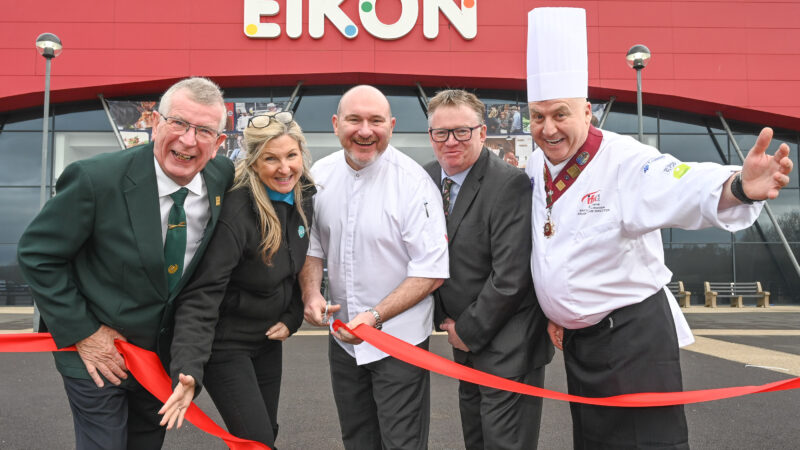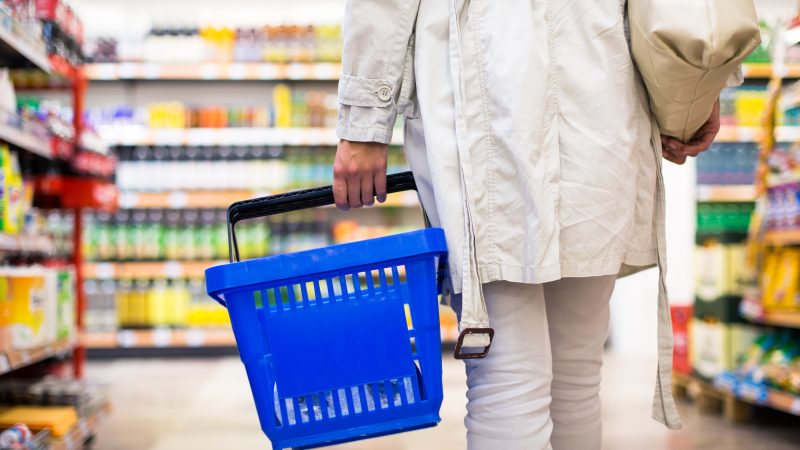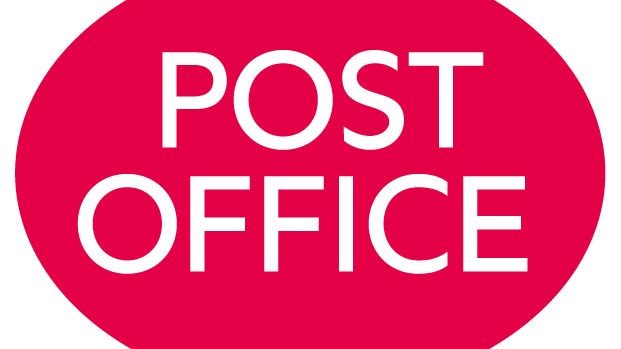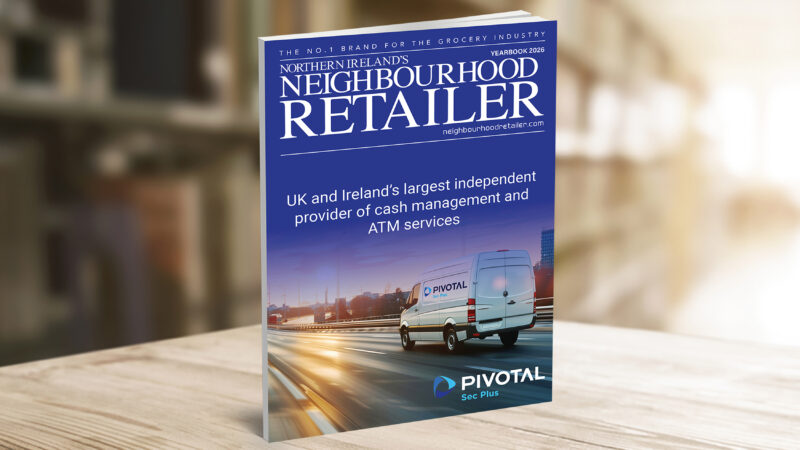Goat tales: why customers are flocking to Broughgammon Meats farm shop
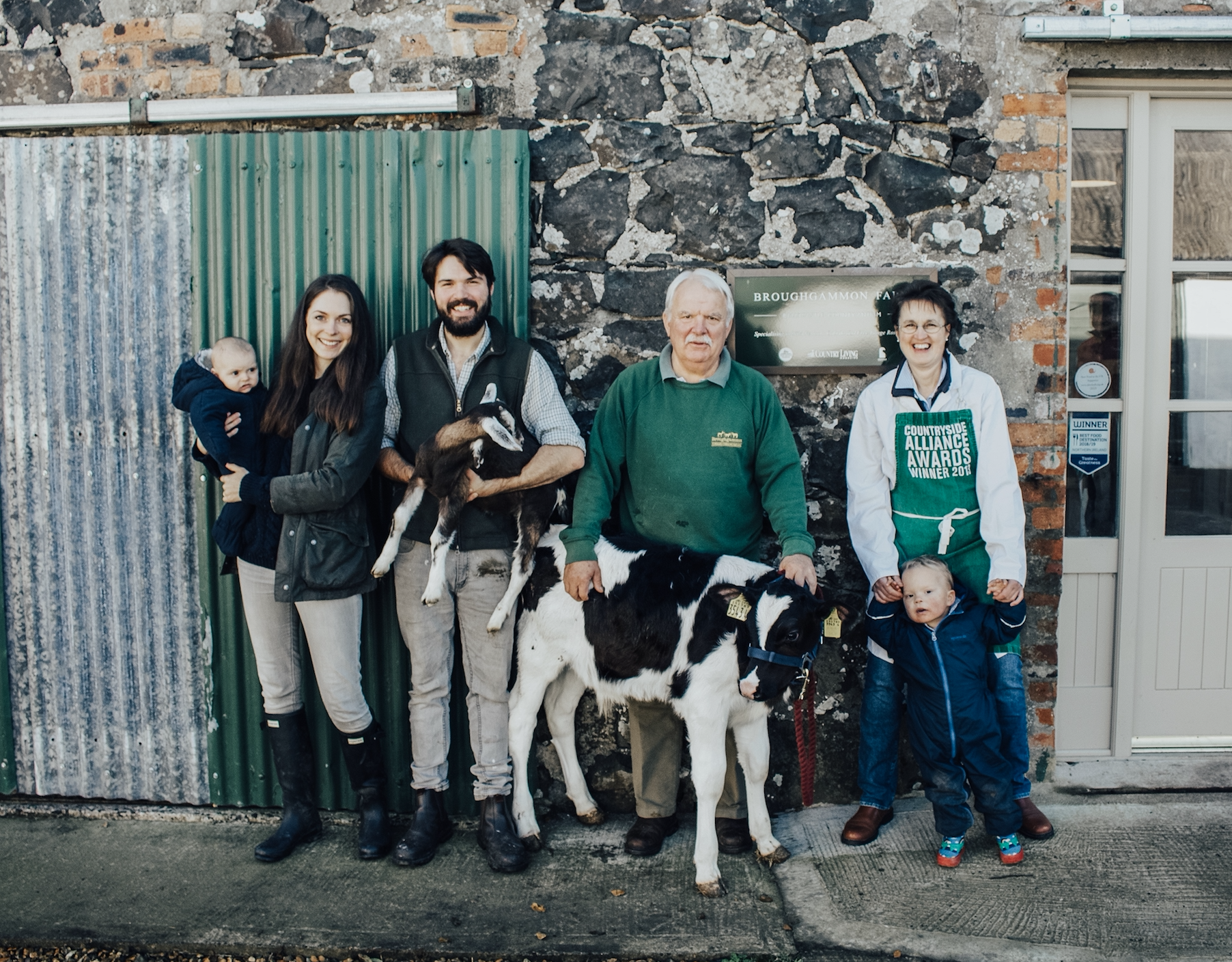
Broughgammon Meats has gone from a street food vendor with a difference to launching its own homegrown farm shop in the North Antrim hills – NR finds out more.
You may have tried the famous Billy Burgers from Broughgammon Farm’s street food van at one of Northern Ireland’s foodie festivals – but did you know the company has its own farm shop?
The company famously created its own market for cabrito meat, aka kid goat meat, before branching into rose veal, but the innovation hasn’t stopped there.
Farmer Charlie Cole famously came up with a route to market for the male kid goats that are a by-product of the goat’s milk dairy industry, as his wife Becky explains. He had begun farming the windswept land owned by his parents near Bushmills.
“When he decided to give farming a go, he stumbled across the idea of the goats and was actually quite surprised to find that all the male goats in the dairy industry were put down at birth. At that time there was very little interest in the goat’s meat industry and they were all seen as a completely unnecessary by-product,” Becky explains.
“Charlie saw it as such a waste. So he started to buy up these little boy goats from the dairies. At the time there were a few old farm buildings but there wasn’t a proper agricultural barn, so he just had a really old derelict caravan where the baby goats lived, and he reared them by hand so it was really basic.”
Billy burgers
Unfortunately one of the very first restaurant orders fell through and the couple were left with a lot of goat meat on their hands. So they made it into burgers and brought it to Tessies Pub in Ballycastle during the Auld Lammas Fair – and the rest is history.
“Everyone who tasted the burgers were like ‘Oh wow, this is genuinely the best burger we’ve ever eaten’. And I think they were all a little bit horrified and shocked when they realised that it was goat burgers that they were eating!” Becky says.
“But it actually started to get us a good reputation. People were really interested in the idea of the Billy Burgers and I can absolutely say, unbiased, that they are absolutely amazing if you haven’t had one. They are really good, so surprisingly amazing.
“So we started off doing a lot of street food, and it was actually such a good way of getting in front of the customer, talking about the story of the dairy and how if we’re having goats cheese or goats milk, the goat meat is a byproduct and not to eat it is crazy, it’s such serious food waste and it creates such a break in the food system.
“Charlie and I would be very environmentally minded as well – it was important to us to create a business that was going to be sustainable with an ethical element to it as well. Our byline is ‘forward thinking farming’, so we want to think about the environment, think about future generations and also think about maintaining the land and creating healthier soil and looking after the place properly and looking after the animals properly.”
Rose veal
The next addition to the range was the free-range rose veal – not the same as veal calves, but another by-product of the dairy industry.
“We decided to take the bull calves on when they were very young and we would wean them off the mothers and rear them outside on grass until they’re teenage bullock size,” Becky says.
“It’s called free range rose veal and it’s actually now really encouraged because it’s a really sustainable meat, outdoor reared and really ethical. It’s a little bit milder than beef in flavour but really good.”
By then, the pair were bringing their street food business all over Ireland to showcase their products, including the likes of Ballymaloe in Co Cork, and were winning a number of awards.
These days, while the spine of the business is still the ethical goat meat and rose veal, the farm now offers free range pork and chicken’s eggs as well as field scale vegetables which are farmed regeneratively to protect the soil and environment.
On-site butchery
“We have our farm shop and cafe on site and we also have an on-site butchery which we’ve had probably for eight years, because it gave us so much more control over our end product to have our own butchery and also made it a much more profitable business,” Becky says.
“It also meant we could create an artisan product. We actually work with Economusee which is a network of artisan producers and we’re part of the Northern Irish collective as an artisan butcher.
“We have no-dig polytunnels and we teach loads of classes as well, everything from fermenting to herbalism and our foraging walks. Even though we do sell to some restaurants we do very much like to sell directly to our customers – we have a very open policy and are very transparent with our customers.
“When the customers come to the farm shop, they’re more than welcome to walk around Port Farm, see the animals, see how they’re reared, go for a dander, see what a nature friendly farm looks like. That’s kind of where we’re at now.”
Farm shop and cafe
The streetfood trailer can still be seen at Ballycastle market and Benone and the farm supplies restaurants like Loose Cannon in Dublin, but one attraction that proved very popular during lockdown was the farm shop and cafe.
“It was about four years ago that we set up the farm shop. It’s a really beautiful round topped barn – it was half falling down but we’ve renovated it now to be a gorgeous, rustic space,” Becky says.
“We’ve got seating in it, and we stock quite a lot of artisan produce too, everything from Neary Nogs to Two Goats Soap. You have local ceramicists and things like that..
“We also have a container where we have all our vegetables – we’ve got pesticide-free regeneratively grown no-dig veg, and pickles and things that we make ourselves.
“And we have really fantastic coffee. We’ve got a cheese counter, we’ve got a hot menu, a breakfast menu using everything that we’ve grown on the farm or reared on the farm. It’s really seasonal and really good quality.
“At the moment because it’s been quite a cold summer, we’ve got our baked camembert. We’ve got a thing called Cavanbert which is like an Irish version, it’s really good and we have it with pickles with our Broughgammon salami with sourdough on it and cheese and salads – it’s all really delicious.
Perfect sausage roll
“We’ve got our beanburgers – people just love those. We do a farm fry because people love fries. We do really good sausage rolls – I remember being in London and we were at a place called the Ginger Pig, it’s a really fancy butcher and there was this huge queue and we looked in and they were selling these sausage rolls and we tasted them, they were amazing, they’re a real thing in London.
“So I was like right, we need to create our own amazing sausage roll. I think the sausage rolls are pretty damn good – lots of butter in the pastry, the real deal.”
The business does all its own home baking, including the likes of brownies, all made with really good ingredients and made from scratch on the farm.
“Throughout the whole year, people come up and we have our meat for sale because we want people to buy that, but we also want people to have a look round the farm and connect with where their food comes from. So we really encourage people to go see the goats or go see the calves and have a walkaround as well,” Becky says.
Supper club
“And then every month we do a supper club in the farm shop after around seven in the evening, one a month, so that’s a way of showcasing what’s seasonal and growing and ripe and ready to pick or what we’ve been rearing on the farm.
“We also do a foraging walk once a month and we do a range of classes through the ebb and flow of the year, depending on how busy we are – butchery classes, fermenting, a Christmas gift making class, meat pie making, herbalism, natural skin care, cheese making, smoking classes, anything really around artisan food production. We do a nature kids club which is really good as well.”
The pandemic did cause a few setbacks to their plans, Becky admits.
“I think what was frustrating with the pandemic was that the farm shop was just beginning to gather momentum and then we had to really change the way we did things,” she says.
Click and collect
“So we did Click and Collect in the farm shop, we had to cancel our supper club and things like that for two solid years which was really frustrating. But we had all our meat boxes and we did cheese box sales on our website, so actually that side of our business did well during Covid.
“We just had to adapt and take away anything that could potentially be a risk at all. We were fairly cautious going back to it because we are a family-run business and if one of us got sick at the time when the restrictions were so huge it would have damaged the business massively, so we’ve only really got back into classes and things like that now. We only started the Supper Club back in spring this year.
“But I think it made us expand what we stocked in the shop a bit more, because we started stocking a little bit more essential stuff and we had more Click and Collect. We had more of a range, so we expanded the shop.
“There have been problems getting the goats this year – we have been noticing that many of the places that we would have purchased baby goats from have gone under or they’ve just been struggling. So we have a lot less baby goats this year, which is why we’ve gone into sheep as well – we’re starting up our own lamb because we needed to quickly diversify.
“So we’ve got lambs, we’ve got pork now, which is fantastic. We do eat our own food and it’s been great to have bacon and things like that added into our diet.
Agroforestry enterprise
“And then we’ve got a six-acre agroforestry field which is an agricultural field that we’ve planted with fruit trees and fruit bushes, raspberries, redcurrants, apples, damsons, and you can still graze the land in between. That will be a new project for us.”
And the plans keep coming – Broughgammon Farm has recently developed a range of salamis as a result of a collaboration with Corndale Charcuterie and they’re keen to add some more charcuterie into the mix.
“I’d like to teach a few more classes – I love the educational side of it and I’d love to be able to open it up for people with special needs, get people out with nature and really enjoying it,” Becky says.
“We’ve also got our first book called The Garden Apothecary which is all about using all the beautiful things that are growing around the farm and making remedies and recipes from them – that was a lockdown project!
“So the things we’d like to showcase and push are the supper clubs, the classes and getting people up into the farm shops and enjoying the beautiful food and the beautiful surroundings.”
To read the full feature in Neighbourhood Retailer, click HERE.

